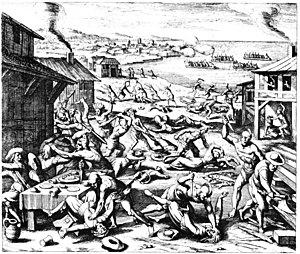
Back المجزرة الهندية في 1622 Arabic Ceymstaun qətliamı Azerbaijani Massacre de Jamestown Catalan Jamestown-Massaker German Masakro de Jamestown Esperanto Masacre indígena de 1622 Spanish 1622ko sarraski indigena Basque قتل عام سال ۱۶۲۲ Persian Jamestownin verilöyly Finnish Massacre indien de 1622 French
| Indian massacre of 1622 | |
|---|---|
| Part of the British colonization of the Americas and the Anglo-Powhatan Wars | |
 1628 engraving of the massacre by Matthäus Merian the Elder | |
| Location | Colony of Virginia |
| Date | 22 March 1622[note 1] |
| Target | English settlers |
Attack type | Massacre |
| Deaths | 347 settlers |
| Perpetrators | Powhatan tribesmen |
| Motive | Colonial encroachment on Powhatan lands |
The Indian massacre of 1622 took place in the English colony of Virginia on 1 April [O.S. 22 March] 1622. English explorer John Smith, though he was not an eyewitness, wrote in his History of Virginia that warriors of the Powhatan "came unarmed into our houses with deer, turkeys, fish, fruits, and other provisions to sell us";[2] they then grabbed any tools or weapons available and killed all English settlers they found, including men, women, and children of all ages. Opechancanough, chief of the Powhatan Confederacy, led a coordinated series of surprise attacks that ended up killing a total of 347 people — a quarter of the population of the Colony of Virginia.
Founded in 1607, Jamestown, Virginia, was the site of the first successful English settlement in North America, and served as the capital of the Colony of Virginia. The town's tobacco economy, which quickly degraded the land and required new land, led to the settlers' constant expansion and seizure of Powhatan lands, ultimately provoking the massacre.[3]
- ^ Mooney, James (1907). "The Powhatan Confederacy, Past and Present". American Anthropologist. 9 (1): 137.
- ^ Mooney, James (1907). "The Powhatan Confederacy, Past and Present". American Anthropologist. 9 (1): 129–152.
- ^ Wood, Origins of American Slavery (1997), p. 72. "By 1620 the colonists were simply taking the acres they required for their expanding tobacco economy without even the pretense of negotiation or payment. Increasing encroachments on indigenous peoples' lands, and particularly onto their hunting grounds, largely accounted for the deterioration of relations between the English and the indigenous populations of the Tidewater Chesapeake that finally exploded in 1622."
Cite error: There are <ref group=note> tags on this page, but the references will not show without a {{reflist|group=note}} template (see the help page).
© MMXXIII Rich X Search. We shall prevail. All rights reserved. Rich X Search